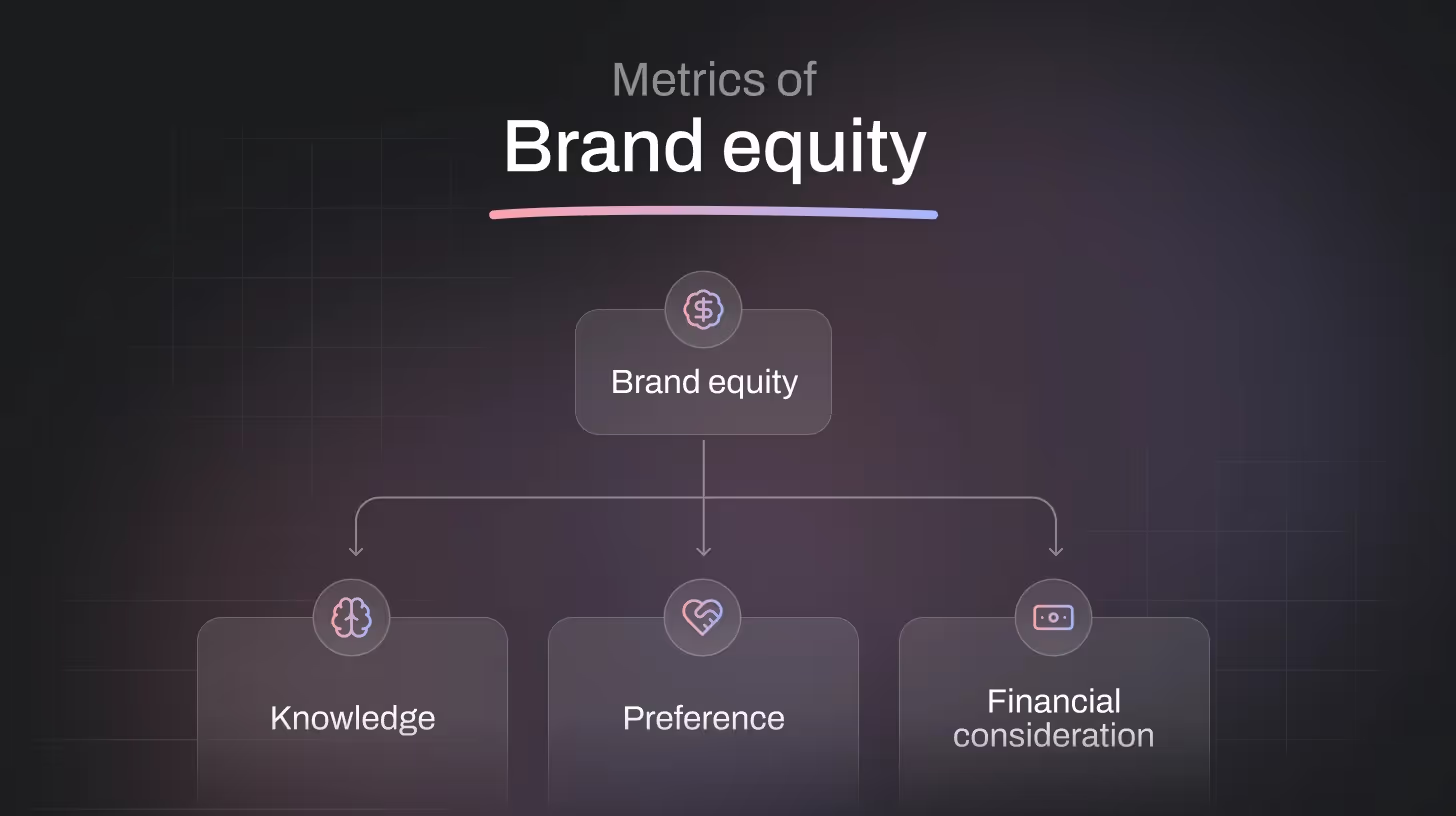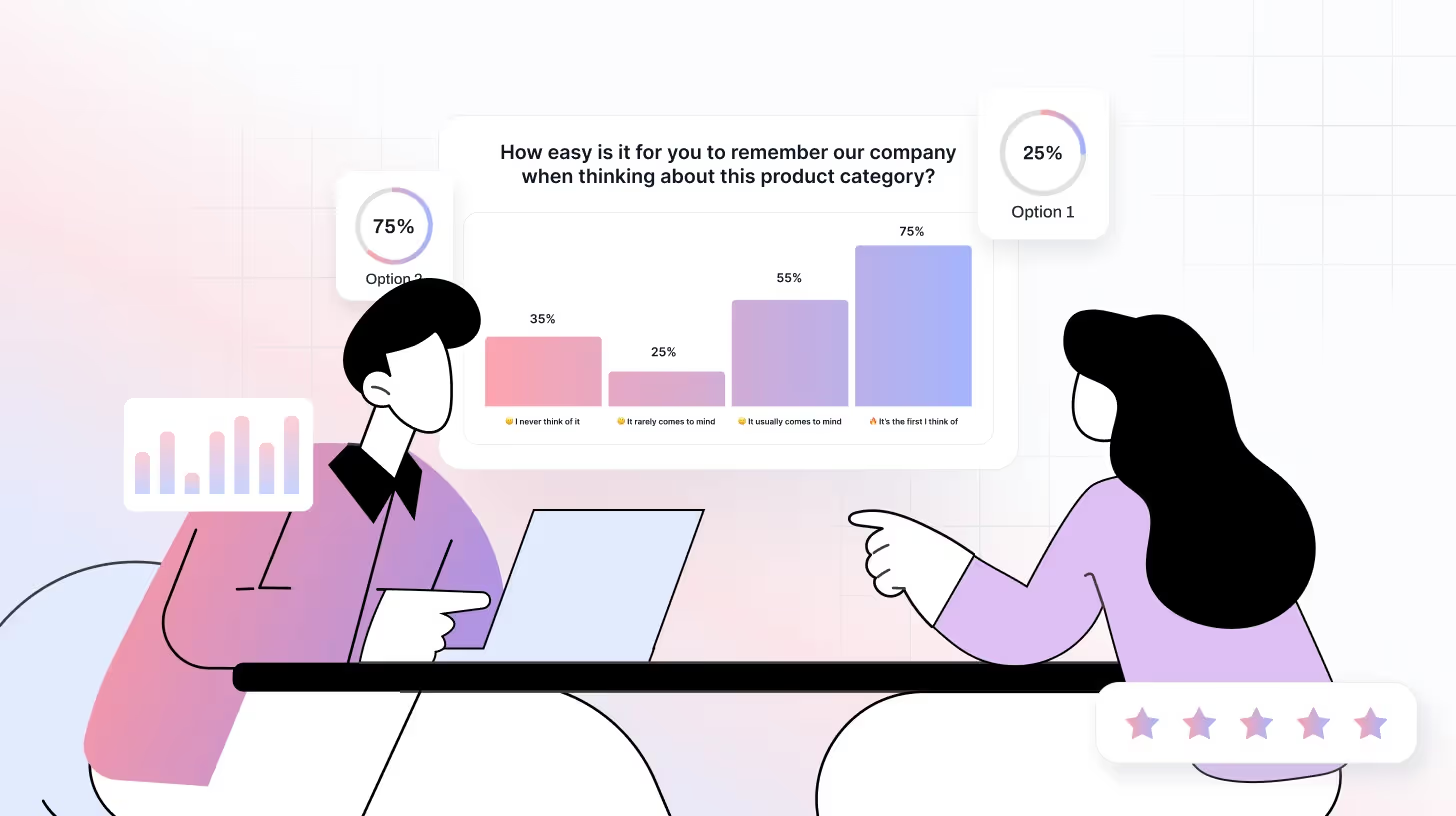 Blog
Blog Brand Equity Survey: Questions, Examples & How to Measure It
Brand Equity Survey: Questions, Examples & How to Measure It Brand Equity Survey: Questions, Examples & How to Measure It

Why do people happily pay more to Starbucks when there are cheaper options around them? Why do some customers line up for every new iPhone, even if their old one works fine? That’s not product quality, it's brand equity. It's the trust, recognition, and emotional connection people feel toward a brand. And it can be the difference between being one of many… or the brand people choose again and again.
Now here’s the question:
Do you know what people really think of your brand?
That’s exactly what the brand equity survey helps you uncover. In this blog, we’ll walk you through what a brand equity survey is, its key components, how to measure it, and questions to ask in your survey to gather valuable insights.
What is the brand equity?
Brand equity refers to the value a brand holds in the minds of its consumers. It’s what makes someone choose your product over a cheaper, no-name alternative, if the quality is the same. It’s built from everything people think, feel, and experience about your brand: your logo, your messaging, your reputation, and the emotions tied to them.
At its core, brand equity has three key parts:
- Brand perception – How people see and feel about your brand.
- The impact of that perception – How it affects their decisions and your business.
- The actual value it creates –In both financial and emotional terms.
Brand equity brings both tangible and intangible benefits:
- Tangible value: More revenue, higher profit margins, stronger market share, and the ability to charge premium prices.
- Intangible value: Customer loyalty, emotional connection, trust, and reputation.

Examples of Companies with Strong Brand Equity
Let’s look at a few brands that have built incredibly strong brand equity over the years.
Apple
Apple is the best example. People don't simply buy Apple products for their specs; they buy them because they believe in the brand, appreciate the design, and experience a sense of status and identity when using them. Apple has developed an emotional connection with its customers that extends far beyond technology. That relationship enables businesses to demand higher rates while still having people queue on launch day.
Nike
Nike is another brand that has created something bigger than its products. It's more than simply footwear; it's about performance, empowerment, and culture. Nike's tagline, "Just Do It," has become a familiar phrase, and its collaborations with top athletes and bold social ads have helped elevate the brand to the status of a symbol of ambition and drive. People wear Nike not only for its comfort and quality, but also for what it represents.
Coca-Cola
Coca-Cola, which is recognised in almost every country. Even if you don't drink soda, you probably have a memory associated with a Coke bottle, such as a family picnic or a holiday ad. Coca-Cola has spent decades incorporating emotive storytelling into its brand, linking it to moments of joy, celebration, and nostalgia.
Google is another standout. It has become so incorporated into our daily lives that we no longer say "search it"; instead, we say "Google it." That degree of brand recognition is difficult to beat. It stems from years of dependability, innovation, and trust, which is why Google dominates the search engine market.
How to Measure Brand Equity with Surveys and Customer Data
Use NPS to Measure Loyalty
The Net Promoter Score (NPS) consists of a single question: "How likely are you to recommend us?". If someone says 9 or 10, they are a promoter. If they say 0-6, they're not too happy. Your NPS reveals how many committed followers you actually have and how many silently churn.
Ask about brand perception
This is where you go deeper. How do others characterise your brand? Do they think you're innovative, trustworthy, entertaining, or out of date? You can question the quality, value, or even how you compare to competitors. Perception surveys help you identify both strengths to build on and shortcomings to address.
Track customer satisfaction
Customer satisfaction leads to increased brand equity. Use brief questionnaires following a purchase or support interaction to enquire, "How satisfied are you?" When satisfaction levels are high, loyalty follows. When they dip, it's time to act immediately.
Monitor What People Say Online
People talk. Social media sentiment analysis enables you to listen. You can determine whether the buzz about your brand is generally positive, negative, or neutral, as well as whether you are referenced more or less than your competitors. It's an excellent real-time monitoring tool for your brand's health.
Analyze Your Price Premium
Can you charge more than others and yet retain customers? That's a strong indicator of brand equity. It means that individuals perceive value in your brand that extends beyond price. If people are willing to spend more, you are doing something well.
Don't Skip Qualitative Feedback
Surveys are useful, but occasionally a chat reveals more. Conduct focus groups or interviews to learn why customers feel the way they do about your brand. You'll gain richer, deeper insights that multiple-choice questions cannot always provide.

Brand Equity Survey Questions + 8 Core Components You Must Measure
Brand equity is shaped over time, comprising multiple layers, including how customers perceive your brand, how consistently you deliver, and the emotional connection your customers have with your brand. Let’s break down some important components that form a strong brand equity, along with question examples :
Brand Awareness
This is where it all starts. If people don’t recognize your brand, they can’t form opinions and build brand loyalty. Brand awareness is about how easily someone can recall your brand when they see your name, logo, or tagline.
Brand awareness survey questions to ask:
- Before today, have you heard of [Brand Name]?
- When you think of [product category], which brands come to mind?
- Which of these brands are you most familiar with? (Multiple choice)
Related read: How a Brand Awareness Survey Can Transform Your Marketing Impact
Brand Associations
Brand associations are the ideas, feelings, and attributes people link to your brand. These could be emotional (fun, safe, empowering), functional (durable, affordable), or even cultural. They help shape your brand’s identity and positioning.
Survey questions to ask:
- What three words come to mind when you think of [Brand Name]?
- Which of the following qualities do you associate with [Brand Name]?
- What does [Brand Name] stand for in your opinion?
Emotional Connection
This extends beyond liking a product. An emotional connection indicates that the brand resonates on a deeper level with your customer's identity, values, or lifestyle. Emotionally linked customers are more loyal, forgiving, and likely to promote your business.
Survey questions to ask:
- Do you feel emotionally connected to [Brand Name]?
- Does [Brand Name] reflect your values or lifestyle?
- How would you feel if [Brand Name] stopped existing tomorrow?
Brand Preference Over Price
This demonstrates whether customers actively choose your brand, even when competing options are less expensive, more widely available, or extensively promoted.
Preference is one of the most obvious markers of brand equity. It means that your brand provides more than simply a product; it also gives them a reason to stay.
Survey questions to ask:
- Would you still choose [Brand Name] if a similar product were cheaper?
- If [Brand Name] wasn’t available, what would you do?
- Which brand would you prefer to buy in this category?
Brand Loyalty
Loyalty is about consistency. It shows whether people return to you, recommend you, and experience a sense of loyalty. Customers who remain loyal increase their value over time. They spend more, churn less, and frequently become vocal supporters.
Survey questions to ask:
- How likely are you to buy from [Brand Name] again?
- Would you recommend [Brand Name] to a friend?
- On a scale of 1–10, how loyal do you consider yourself to [Brand Name]?
Recommended read: Boost Satisfaction and Loyalty by Using the Smart Client Survey Tool!
Did you know?
78% of consumers stay loyal to brands that 'understand them'" (Source: Salesforce)
Brand Differentiation
This relates to how distinctively your brand stands out in the marketplace. It's not enough to be different; you must also be unique in a way that resonates with your target market.
If you blend in, price becomes the sole differentiation. If you stand out, your brand will be the reason people buy.
Survey questions to ask:
- What makes [Brand Name] different from other brands in this space?
- Do you feel [Brand Name] offers something unique?
- Would you say [Brand Name] is a leader or a follower in its industry?
Brand Consistency
Consistency means showing up the same way across all touchpoints visually, verbally, and experientially. Inconsistency creates confusion. Consistency builds trust and recognition over time.
Questions to ask in the brand equity survey:
- How consistent is [Brand Name]'s messaging across its channels?
- Does [Brand Name] always meet your expectations?
- Do you feel you know what to expect from [Brand Name]?
Brand Trust
Trust is the foundation of long-term brand relationships. It means your customers believe you will fully deliver on your promises and exceed expectations. For example, Patagonia has built deep trust through its environmental values, ethical sourcing, and transparency. People don’t just buy from Patagonia—they believe in it.
Survey questions to ask:
- How much do you trust [Brand Name] to deliver on its promises?
- Do you believe [Brand Name] cares about its customers?
- Would you feel safe recommending [Brand Name] to others?
Brand Equity Survey Template
Use this cheat sheet to assess your brand’s equity using customer insights quickly.
1. Which of the following brands are you familiar with?
(Multiple choice — allow more than one selection)
☐ [Your Brand]
☐ Competitor A
☐ Competitor B
☐ Competitor C
☐ None of the above
2. What three words come to mind when you think of [Your Brand]?
(Open text)
[Free text response box]
3. How likely are you to recommend [Your Brand] to a friend or colleague?
(Net Promoter Scale)
○ 0 – Not at all likely
○ 1
○ 2
○ 3
○ 4
○ 5
○ 6
○ 7
○ 8
○ 9
○ 10 – Extremely likely
4. Compared to other brands in this category, how would you rate the quality of [Your Brand]'s products/services?
(Single choice)
○ Much better
○ Slightly better
○ About the same
○ Slightly worse
○ Much worse
5. Do you feel emotionally connected to [Your Brand]?
(Single choice)
○ Yes, very much
○ Somewhat
○ Not really
○ Not at all
6. If [Your Brand] wasn’t available, what would you do?
(Single choice)
○ Wait or find [Your Brand] elsewhere
○ Buy from a competitor
○ Cancel or delay the purchase
○ Not sure
Measure Your Brand Equity with TheySaid
You could piece together brand equity data from scattered tools, spreadsheets, and manual surveys...
Or you could just use TheySaid.
With TheySaid, you can easily track how people perceive your brand, how loyal they are, and what keeps them coming back (or not). Our AI-powered surveys help you dig deeper than generic feedback, so you get real, actionable insights, not just scores and charts.
Brand equity is built one experience at a time. With TheySaid, you can measure each of them.
Ready to see how your brand is really doing? Start your brand equity survey with TheySaid.
Key Takeaways
- Try asking your customers this eye-opening question: "Would you still choose us if another brand offered the same thing for 20% less?" Their answers will reveal how strong your brand really is—and where you need to improve.
- The most powerful brands create emotional connections that go beyond products. Find out how attached your customers are by asking: "How would you honestly feel if our brand disappeared tomorrow?
- Focus on Brand awareness, brand associations, emotional connection, brand loyalty, preference over price, brand differentiation, consistency, and trust.
- Combine NPS, perception surveys, satisfaction data, social sentiment, and qualitative feedback for a full view.
- Instead of juggling tools, TheySaid helps you launch, analyze, and act on brand equity surveys — all in one place, with built-in AI to surface insights that matter.
FAQs
What are examples of brand equity survey questions?
Here are a few powerful questions to include:
- “What three words come to mind when you think of our brand?”
- “Would you choose our brand over a cheaper alternative?”
- “How emotionally connected do you feel to our brand?”
- “How likely are you to recommend us?”
What is brand equity analysis?
Brand equity analysis is the process of evaluating all the data that reflects your brand’s value, including survey results, market share, pricing power, customer loyalty, and public sentiment. It helps you understand how your brand is performing and where it needs improvement.
How often should I run a brand equity survey?
Ideally, you should run brand equity surveys quarterly or biannually. This helps you track progress over time and respond quickly to shifts in perception or loyalty.





%20Surveys_%20Types%2C%20Benefits%20%26%20Success%20Strategies.webp)










.svg)